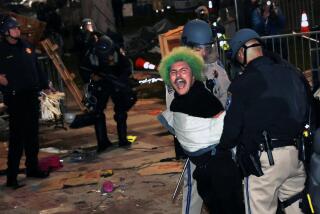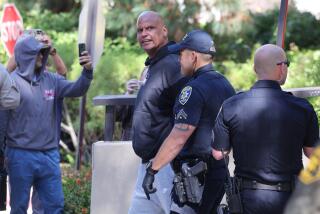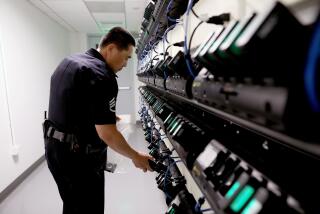Police Filming of Protests Called Intimidating : Demonstrations: War foes complain, and the ACLU says surveillance has a “chilling effect,” but police counter that videotaping helps document violence or arrests.
- Share via
War protesters are complaining that San Diego police are unnecessarily videotaping their demonstrations and frightening away protesters who want to speak out but do not want to be filmed.
Police have taped several rallies connected to the 2-week-old war in the Persian Gulf. But protesters said their presence was most noticeable last Sunday at a Balboa Park peace vigil, when police stood atop the San Diego Museum of Natural History with videotape equipment, still cameras and binoculars.
Cmdr. Larry Gore, a police spokesman, said filming is appropriate and occurs whenever San Diego police believe the possibility of a violent confrontation exists. If arrests are made, the film is used as evidence, he said.
But an attorney for the American Civil Liberties Union said videotaping “can have a chilling effect on legitimate activities protected by the First Amendment.”
“As a general rule, we could set up video cameras to cover everything that happens in San Diego and discard all those that don’t involve criminal activity,” said the ACLU’s Betty Wheeler. “It creates a reasonable apprehension on the part of those whom the police choose to videotape.”
Members of the Coalition for Peace in the Middle East, which has organized the Balboa Park vigils each Sunday since November, say the cameras are keeping protesters away.
“We want to know exactly what the role of the police is while people are out there exercising their constitutional right for peaceful protest,” said Patricia Gardiner, a member of the coalition’s steering committee.
“Are they there to provide security and law and order or are they there to take pictures and provide surveillance?” she asked. “It frightens a lot of people and keeps them away.”
Gardiner said her organization is requesting a meeting with police to discuss the videotaping.
Taping by police has often been criticized, most recently last November when police taped people who spoke out at community forums about the department’s use of deadly force.
Police held several forums in which they did not tell speakers they were being taped. When some in the audience discovered and complained about the cameras, Police Chief Bob Burgreen apologized. At subsequent forums, speakers were given the choice of whether they wanted their remarks videotaped.
Burgreen said at the time that he was making a tape that would include police and citizen input about the lethal force issue, and that he was not keeping a file on police critics, as some had charged.
In 1987, a police video technician with a press pass hanging from his belt filmed a Greenpeace demonstration accompanied by an undercover officer. Burgreen, then assistant chief, stopped the practice after journalists questioned the tactic.
Surveillance and videotaping has long occurred in the Police Department, police spokesman Gore said. Protests and demonstrations are routinely taped to gather evidence in case of violence and arrests, he said.
“In fact, violence does occur, and we use the tapes for evidence because, when you have so many people, you start to have identification problems,” he said. “The videotape helps reconstruct what happens and what caused it to get out of hand.”
Gore said the fact that police are videotaping and snapping pictures is no secret, nor is the taping unique to events in the Persian Gulf. Police often show up at abortion protests and hire videotape technicians to film events whenever possible, he said.
“If an individual seems to be inciting the crowd and is causing the problem and has been asked to refrain and is not complying with legal or lawful orders, that person’s going to get his face in the camera,” Gore said. “It’s fine for someone to come back and say they didn’t do something, unless we have it on tape.”
Gore said police are careful not to choose sides in a demonstration, and anyone could be filmed.
“These are very emotional issues, and even though we’ve got our private beliefs, our professional responsibility and position is one of neutrality,” he said. “Our purpose is to maintain the peace.”
The Police Department has a video-graphics unit with civilian employees who film the events and operate the equipment, he said. Commanding officers at the scene determine what should be filmed, he said.
Gore said the department films over the videotape if no trouble emerges. If arrests are made, however, “the film is invaluable to sort out what caused what and what charges are appropriate,” he said.
Undercover intelligence officers attend some demonstrations to find known agitators or criminals, Gore said.
“An awful lot of organizations have, as their avowed purpose, to hurt someone,” he said. “When those kinds of individuals present themselves, we’ll have officers at their elbows.”
Members of the Coalition for Peace in the Middle East have met twice with San Diego police, each time before protests at the Federal Building, but have not discussed videotaping.
The coalition has held one-hour protest vigils each Sunday since November that at first attracted several hundred people, then nearly 5,000 the Sunday after war broke out.
Last Saturday, the coalition began weekly protests in front of various post offices. The group also marched in the Martin Luther King Jr. Day parade.
In Balboa Park Sunday, protesters noticed police standing atop the San Diego Museum of Natural History during the vigil, which attracted about 1,500.
“They seemed to have a load of equipment up there,” Gardiner said. “There were about five or six people up there, some in uniforms. It leads to a climate of fear.”
Isaac Artenstein, an independent filmmaker, said he noticed six to 10 uniformed officers on the museum’s roof, some with binoculars. A video photographer with a San Diego police baseball hat and identification tag filmed the proceedings.
“It kind of saddens me that the worst in American society comes to the fore in these times of crisis,” Artenstein said. “We know the history of surveillance during the civil rights movements and peace movements of the 1960s, and it’s upsetting that it’s happening again.”
Police spokesman Gore said those who aren’t causing trouble needn’t worry.
“If you’re obeying the law and exercising your constitutional rights and are within the bounds of decency, you’ll be all right,” Gore said. “But people have to remember that, when you’re out in a public setting and you’re demonstrating, your right to privacy isn’t the same as if you’re in your home.”
More to Read
Sign up for Essential California
The most important California stories and recommendations in your inbox every morning.
You may occasionally receive promotional content from the Los Angeles Times.










